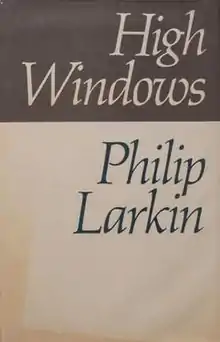High Windows
High Windows is a collection of poems by English poet Philip Larkin, and was published in 1974 by Faber and Faber Limited. The paperback version was first published in Britain in 1979. The collection is the last publication of new poetry by Larkin before his death in 1985, and it contains some of his most famous poems, including the title piece, "High Windows", "Dublinesque", and "This Be The Verse".[1] The collection contains themes presented in his earlier collections, though the tone of the poems caused critics to suggest the book is darker and more "socially engaged" than his earlier volumes.[1][2][3][4] It is currently on the AQA AS/A2 level English Literature syllabus.
 First edition | |
| Author | Philip Larkin |
|---|---|
| Country | United Kingdom |
| Language | English |
| Genre | Poetry |
| Published | 1974 (Faber and Faber) |
| ISBN | 0-571-20275-6 |
| OCLC | 46613746 |
| Preceded by | The Whitsun Weddings |
Poems
The volume contains 24 poems:
| Sequence | Poem title | Completion date |
|---|---|---|
| 1 | To the Sea | Oct 1969 (best known date) |
| 2 | Sympathy in White Major | 31 Aug 1967 |
| 3 | The Trees | 02 Jun 1967 |
| 4 | Livings: I, II, III | 10 Dec 1971 |
| 5 | Forget What Did | 06 Aug 1971 |
| 6 | High Windows | 12 Feb 1967 |
| 7 | Friday Night in the Royal Station Hotel | 20 May 1966 |
| 8 | The Old Fools | 12 Jan 1973 |
| 9 | Going, Going | 25 Jan 1972 |
| 10 | The Card-Players | 6 May 1970 |
| 11 | The Building | 09 Feb 1972 |
| 12 | Posterity | 17 Jun 1968 |
| 13 | Dublinesque | 06 Jun 1970 |
| 14 | Homage to a Government | 10 Jan 1969 |
| 15 | This Be The Verse | Apr 1971 (best known date) |
| 16 | How Distant | 24 Nov 1965 |
| 17 | Sad Steps | 24 Apr 1968 |
| 18 | Solar | 04 Nov 1964 |
| 19 | Annus Mirabilis | 16 Jul 1967 |
| 20 | Vers de Société | 19 May 1971 |
| 21 | Show Saturday | 03 Dec 1973 |
| 22 | Money | 19 Feb 1973 |
| 23 | Cut Grass | 03 Jun 1971 |
| 24 | The Explosion | 05 Jan 1970 |
Critical reception
Clive James, in As of this writing, describes High Windows as Larkin's bleakest volume of poetry, though he does admit that there are aspects of the poetry that contain the humour found in Larkin's earlier books of poetry. James suggests that Larkin has never liked the idea of a poet "Developing" and that Larkin himself remains the same throughout his career as a poet. High Windows, in James's opinion, shows that Larkin simply strives, with the addition of each poem, to state more clearly the same principles shown by his early works and concludes that "The total impression of High Windows is of despair made beautiful."[4]
References
- Cooper, Stephen.Philip Larkin: Subversive Writer. Sussex Academic Press (2004)p.170
- Swarbrick, Andrew. Out of Reach: The Poetry of Philip Larkin London Macmillan (1995)pp.122-123
- Regan, Stephen. Philip Larkin. Palgrave Macmillan (1997) p.124
- James, Clive. As of This Writing.W. W. Norton & Company(2003)p.57